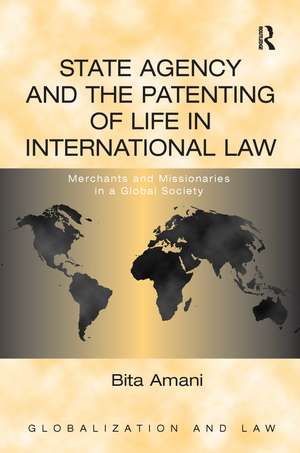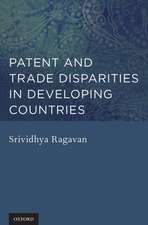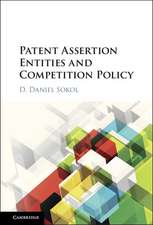State Agency and the Patenting of Life in International Law: Merchants and Missionaries in a Global Society: Globalization and Law
Autor Bita Amanien Limba Engleză Paperback – 28 noi 2016
| Toate formatele și edițiile | Preț | Express |
|---|---|---|
| Paperback (1) | 327.29 lei 6-8 săpt. | |
| Taylor & Francis – 28 noi 2016 | 327.29 lei 6-8 săpt. | |
| Hardback (1) | 852.22 lei 6-8 săpt. | |
| Taylor & Francis – 28 iul 2009 | 852.22 lei 6-8 săpt. |
Preț: 327.29 lei
Preț vechi: 433.78 lei
-25% Nou
Puncte Express: 491
Preț estimativ în valută:
62.63€ • 68.01$ • 52.61£
62.63€ • 68.01$ • 52.61£
Carte tipărită la comandă
Livrare economică 22 aprilie-06 mai
Preluare comenzi: 021 569.72.76
Specificații
ISBN-13: 9781138254206
ISBN-10: 1138254207
Pagini: 400
Dimensiuni: 156 x 234 mm
Greutate: 0.62 kg
Ediția:1
Editura: Taylor & Francis
Colecția Routledge
Seria Globalization and Law
Locul publicării:Oxford, United Kingdom
ISBN-10: 1138254207
Pagini: 400
Dimensiuni: 156 x 234 mm
Greutate: 0.62 kg
Ediția:1
Editura: Taylor & Francis
Colecția Routledge
Seria Globalization and Law
Locul publicării:Oxford, United Kingdom
Cuprins
Contents: Foreword; Preface; Regulatory diversity and the patenting of life; The promise and perfidy of patents; Origins of the patented species: of mice and men, and the sincerity of 'invention'; The global governance of trade: trading in political ethics; TRIP'ing over human rights: a legitimacy crisis at the WTO; The sovereign right to self-determination: from agency to development and dignity; Reconciling competing international obligations: the equitable conduct defence and the stewardship of the WTO; Conclusion: Selected bibliographic sources; Index.
Notă biografică
Bita Amani is Assistant Professor in the Faculty of Law, Queen's University, Canada. Her research interests are in the areas of Intellectual Property Law (domestic and International), Regulating Genetics and New Technologies, Biopiracy and Protection of Traditional and Cultural Knowledge, Regulatory and Ethical Issues of Medical/Scientic Research and its commercialization, Globalization and Social Justice, International Law, Regulatory Diversity, and Torts.
Recenzii
'Dr Amani's book is a fine work of scholarship. It mounts a powerful, original and sophisticated critique of the trade-related intellectual property regime. However, it does not just criticise; indeed, its prescription, based on the elaboration of an equitable conduct defence consistent with universal human rights norms, demands serious consideration.' Graham Dutfield, University of Leeds, UK 'Amani persuades readers through her extensive political and legal analysis that states not only have significant legal agency when it comes to responding to the patenting of life forms, but that they must deploy it responsibly to exercise sovereignty under globalizing conditions. This is an important and timely intervention. Rosemary J. Coombe, Canada Research Chair, York University, Canada
Descriere
This important and timely volume considers competing international obligations in relation to the patenting of life, offering a pragmatic two-step approach to state agency to resolve apparent conflicts between the regulatory options afforded by economic globalization and the need to forge domestic laws that reflect community values.
















